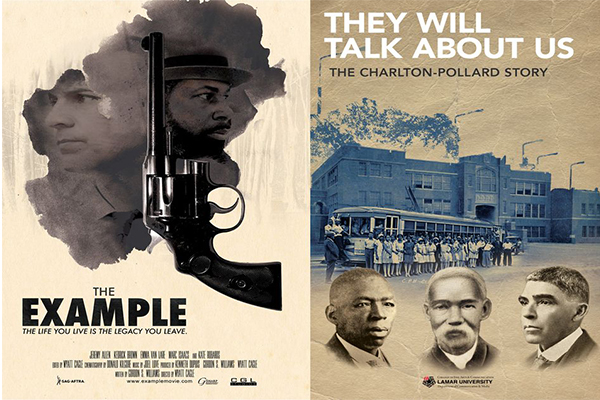Films on Beaumont’s Black history aim to spark conversation during screenings at Dishman Art Museum
The history of Beaumont’s Black community will be on display Thursday, Feb 2. in the Dishman Art Museum auditorium where a screening of “Beaumont’s Black History – In Moving Pictures” will take place. The historical fiction short film “The Example” and the documentary “They Will Talk About Us: The Charlton-Pollard Story” will be screened, followed by a reception and a question and answer session. The event runs from 5:30-8 p.m. and is free and open to the public.
The screening is being hosted by the Lamar University Center for History and Culture of Southeast Texas and the Upper Gulf Coast and by the Division of Strategic Initiatives and Community Relations.
With the impact the two projects have had on the local community and beyond and with the 80th anniversary of the 1943 Beaumont race riot in June, it was deemed necessary to screen the projects to spark conversation and tell the stories that many may not know.
 “It’s important with the 80th anniversary of the race riot this year and with the success the documentary is having,” said Gordon Williams, LUTV station operations manager and writer of both projects. “We felt it would be a great way to package them and to have meaningful conversations and share history.”
“It’s important with the 80th anniversary of the race riot this year and with the success the documentary is having,” said Gordon Williams, LUTV station operations manager and writer of both projects. “We felt it would be a great way to package them and to have meaningful conversations and share history.”
According to Williams, both projects have opened the door for LU students, faculty, alumni and other communication professionals to become involved and to showcase the talent located in Southeast Texas
“It’s also important for us to show that we have a production community in Southeast Texas,” he said. “A number of talented people have come through this department, and through this area, and I’m hoping people can recognize that and see it as valuable. Hopefully it will inspire those in the production community so we can try to create a viable industry at some point with talented craftspeople, and I think the education given here is a huge part of that.”
Williams cited that the main goal, however, is to hopefully create conversation amongst the community following the screening.
“I think in screening these projects, very few occasions have we had the opportunity to have a reception afterwards,” he said. “So, I’m hoping conversations will come from them.”
For Williams, it has never been about the awards or success brought on by the projects. It has always been about education and conversation.
“Whether people agree with what they see on the screen or agree with each other, having the opportunity to respectfully share thoughts, feeling and opinions is a powerful thing,” he said.
